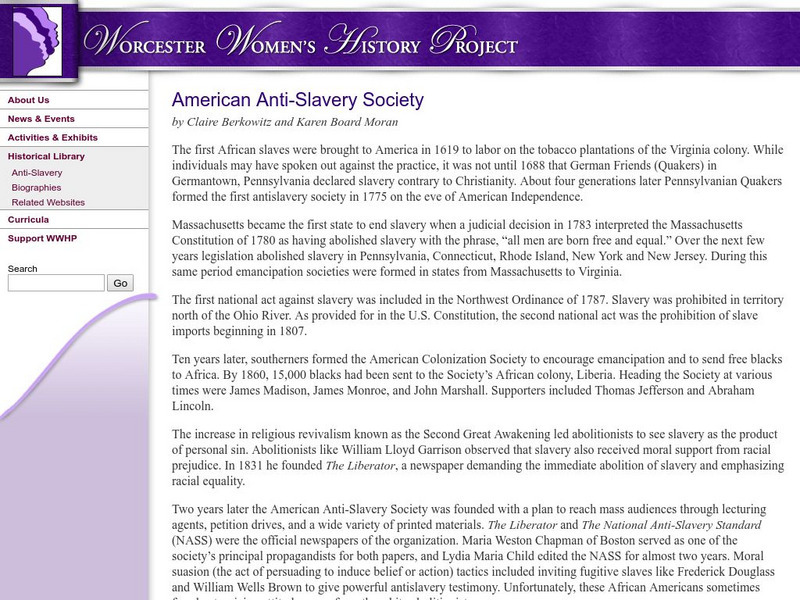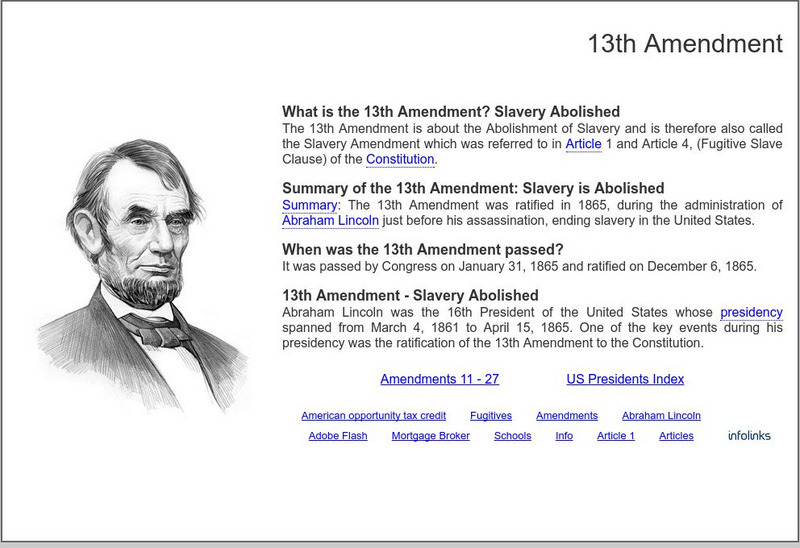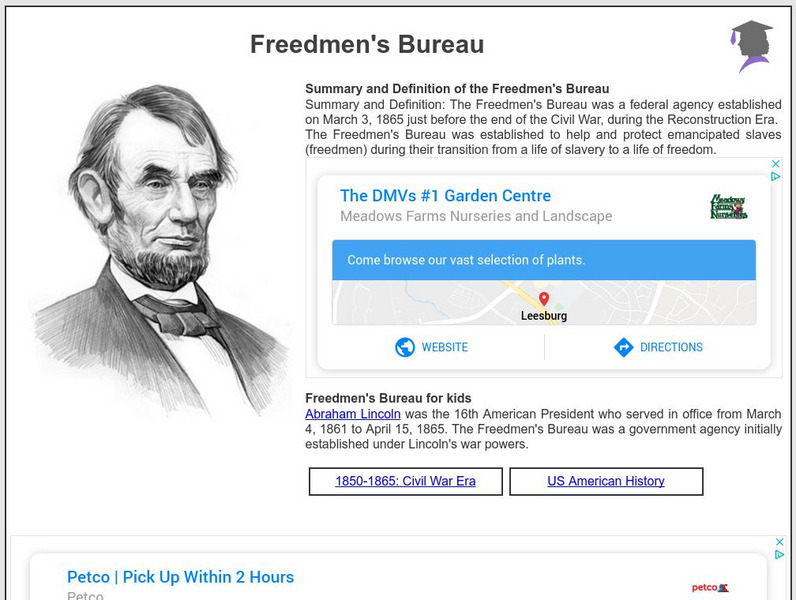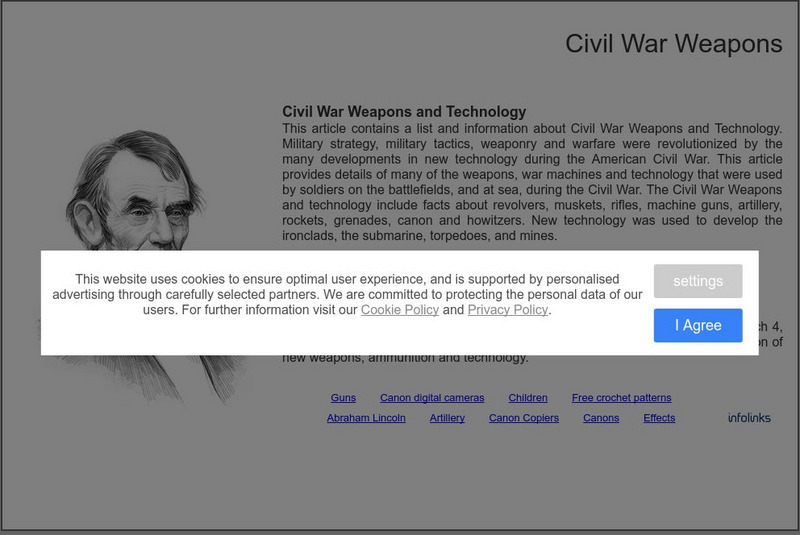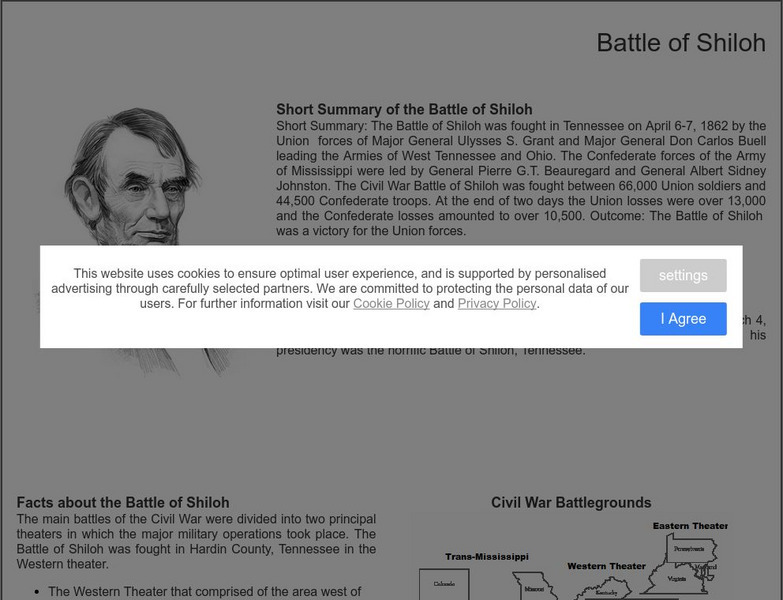University of Groningen
American History: Outlines: Industrial Growth
By 1860, when Abraham Lincoln was elected president, 16 percent of the population lived in urban areas and a third of the nation's income came from manufacturing. Funds were flowing into large-scale industrial development and into...
Other
Wwhp: American Anti Slavery Society
A good review of the evolution of the support for the abolition of slavery from the first anti-slavery organization formed by the Quakers to the support for Abraham Lincoln as president. Focus is on the American Anti-Slavery Society and...
ClassFlow
Class Flow: Secession
[Free Registration/Login Required] This flipchart describes events leading to secession, including John Brown's Raid, Lincoln's election, and South Carolina's break with the Union. It also includes information on the first states to...
Mocomi & Anibrain Digital Technologies
Mocomi: Mount Rushmore Facts and History
Provides the history of Mount Rushmore with many interesting facts.
Curated OER
Educational Technology Clearinghouse: Clip Art Etc: Oliver Perry Morton
Oliver Hazard Perry Throck Morton (August 4, 1823 - November 1, 1877) was a U.S. Republican Party politician from Indiana. He served as governor of Indiana during the Civil War, and was a stalwart ally of President Abraham Lincoln.
Curated OER
Educational Technology Clearinghouse: Clip Art Etc: Salmon Portland Chase
Salmon Portland Chase was an American politician and jurist in the Civil War era who served as U.S. Senator from Ohio and Governor of Ohio; as U.S. Treasury Secretary under President Abraham Lincoln; and as Chief Justice of the United...
Curated OER
Educational Technology Clearinghouse: Clip Art Etc: William Dennison
William Dennison, Jr. (November 23, 1815 - June 15, 1882) was a Whig and Republican politician from Ohio. He served as the 24th Governor of Ohio and as U.S. Postmaster General in the Cabinet of President Abraham Lincoln during the...
Siteseen
Siteseen: American Historama: Reconstruction Era
Covers the Reconstruction of the South after the Civil War from 1865-1877.
Siteseen
Siteseen: Government and Constitution: 13th Amendment
The 13th Amendment was passed by Congress on January 31, 1865, but not ratified until December 6, 1865. This article provides an explanation and summary of the 13th Amendment or Fugitive Slave Clause that abolished slavery.
Siteseen
Siteseen: American Historama: Freedmen's Bureau
Interesting facts about the Freedmen's Bureau established to help and protect emancipated slaves (freedmen)in 1865.
Siteseen
Siteseen: Civil Conflict: Civil War Weapons
Article contains detailed facts and information about weapons and technology used during the Civil War. There were military breakthroughs, changing the way the Civil War was fought.
Siteseen
Siteseen: Civil Conflict: Battle of Chickamauga
Article contains interesting facts and information about the Battle of Chickamauga, one of the major battles that were fought during the Civil War on September 19-20, 1863.
Siteseen
Siteseen: Civil Conflict: Battle of Chancellorsville
Article contains interesting facts and information about the Battle of Chancellorsville, one of the major battles that were fought during the Civil War on May 1-4, 1863.
Siteseen
Siteseen: Civil Conflict: Battle of Shiloh
Article contains interesting facts and information about the Battle of Chancellorsville, one of the major battles that were fought during the Civil War on April 6-7, 1862.
Curated OER
Educational Technology Clearinghouse: Clip Art Etc: Andrew Johnson
Andrew Johnson (December 29, 1808 - July 31, 1875) was the seventeenth President of the United States (1865-69), succeeding to the Presidency upon the assassination of Abraham Lincoln. He was one of only two U.S. Presidents to be...
Curated OER
Educational Technology Clearinghouse: Clip Art Etc: John Wilkes Booth
John Wilkes Booth was an American stage actor who assassinated Abraham Lincoln, the 16th President of the United States, at Ford's Theatre in Washington, D.C. on April 14, 1865.
Curated OER
Educational Technology Clearinghouse: Clip Art Etc: Stephen Arnold Douglas
Stephen Arnold Douglas (April 23, 1813 - June 3, 1861) was an American politician from the western state of Illinois, and was the Democratic Party nominee for President in 1860. He lost to the Republican Party's candidate, Abraham Lincoln.
Curated OER
Mount Rushmore
Presents images and descriptive details of this national monument that features the faces of past U.S. Presidents: George Washington, Thomas Jefferson, Theodore Roosevelt, and Abraham Lincoln.



